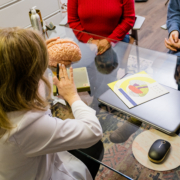Understanding dementia
Many people are familiar with Alzheimer’s Disease, but they may not know that it is one of several conditions that cause dementia. Dementia is a group of signs and symptoms that affect memory, thinking, language, and other brain functions. While Alzheimer’s Disease is the leading cause of dementia in the United States, other diseases and conditions can also cause dementia. In addition, many people with Alzheimer’s Disease also have at least one other condition that can cause dementia, known as mixed dementia.
Vascular dementia, Lewy body dementia, and frontotemporal dementia are the three most common other causes of dementia. However, dementia can also be caused by other medical conditions such as advanced HIV, traumatic brain injury, certain vitamin deficiencies, and prion diseases such as Creutzfeldt-Jakob disease caused by misfolded proteins in the brain. Depression, alcohol use, and certain medications can also cause or worsen dementia symptoms.
June is Alzheimer’s and Brain Awareness Month. That means now is a great time to discuss and learn about Alzheimer’s Disease and other conditions that cause dementia.
Vascular Dementia
Vascular dementia is the second most common cause of dementia after Alzheimer’s Disease. This form of dementia is caused by strokes or other conditions that block the flow of blood to the brain. About one in 10 people with dementia have vascular dementia alone, and about another one-third have vascular dementia mixed with Alzheimer’s Disease or another cause of dementia.
Unlike Alzheimer’s Disease, symptoms of vascular dementia usually either come on suddenly following a stroke (sometimes called post-stroke dementia) or bit by bit after a series of smaller strokes (called multi-infarct dementia). Some people with vascular dementia may not even know they have had a stroke until their doctors find signs of a past stroke on brain images.
Symptoms of vascular dementia may differ depending on the parts of the brain that are affected. However, the most common symptoms of vascular dementia are slowed thinking, difficulty following instructions, and having a hard time doing things that used to be easy to do.
While there is no known cure for vascular dementia, there are steps people can take to lower their risks of future strokes, according to Dr. Mark Bondi, director of the Neuropsychological Assessment Unit at the Veteran’s Affairs San Diego Healthcare System.
“Minimizing one’s vascular risks (e.g., hypertension, hyperlipidemia, diabetes), working to improve one’s diet, and incorporating movement and exercise into one’s regular daily and weekly routines are modifiable factors each of us has the power to accomplish,” says Dr. Bondi, who also is a Distinguished Professor of Psychiatry at the University of California San Diego, and a fellow of the American Psychological Association and National Academy of Neuropsychology (NAN). “And the available evidence demonstrates that if such factors are incorporated in mid-life, they lessen dementia risk in late life. The sooner one effects such changes, the better the odds that they’ll benefit you later.”
Lewy Body Dementia
Lewy Body Dementia is the third most common cause of dementia. It is named after abnormal clumps of proteins, called Lewy bodies, that build up inside the brain cells of people with this condition. Lewy Body Dementia usually develops in people aged 50 or older, and it occurs slightly more often among men than women.
Usually, the first sign of Lewy Body Dementia is thrashing, kicking, or yelling during sleep as if the individual were acting out their dreams. These sleeping symptoms often get milder over time. As their condition progresses, people with Lewy Body Dementia typically have difficulties with paying attention that may come and go, vivid visual hallucinations, and problems with movement and balance similar to those with Parkinson’s Disease.
According to Dr. David Salmon, Professor in the Department of Neurosciences and Helen A. Jarrett Chair for Alzheimer’s Disease Research at the University of California San Diego, people with Lewy Body Dementia “may need even more support than a person with Alzheimer’s disease would need to be able to maintain daily function.” He added that symptoms of Lewy Body Dementia “can have a large impact on their ability to perform everyday activities on their own.”
Although some of the symptoms of Lewy Body Dementia may overlap with those of Alzheimer’s Disease, Dr. Salmon noted that newer treatments for Alzheimer’s Disease “may … provide little or no clinical benefit” to people with Lewy Body Dementia. However, he added that medications specific to Lewy Body Dementia “are still in the early stages of development.”
Frontotemporal Dementia
Frontotemporal dementia (FTD) is a group of brain conditions that primarily affect the frontal lobe – the part of the brain responsible for planning, judgment, personality, and attention – and the temporal lobe – the part of the brain that processes memories and hearing. These conditions used to be called “Pick’s disease” after Dr. Arnold Pick, who first described them, but today experts recognize that FTD includes a broader range of symptoms than its initial description. About 10 to 20 percent of dementia falls under the category of FTD.
The first symptoms of FTD typically happen between 45 to 65 years of age, earlier than symptoms of Alzheimer’s Disease usually begin. Changes in personality and behavior are usually the main symptoms of FTD. Affected people may act impulsively or say things that are rude or inappropriate. Problems with language, movement, or balance may be the main symptoms in some other people with FTD. While FTD can cause memory difficulties, they usually don’t happen until later in life.
Frontotemporal dementia tends to be inherited. Up to half of all people with FTD have another family member with dementia. While experts don’t yet know the exact causes of FTD, people with FTD usually have a build-up of proteins inside their brains, which can get tangled up and damage brain cells, similar to the brains of people with Alzheimer’s Disease. However, current treatments for Alzheimer’s Disease do not usually help with FTD and may even worsen symptoms of FTD.
People who suspect that they or a loved one may have dementia should speak with their doctors. Early detection is important because some symptoms of dementia can be treated. Doctors may also recommend steps to reduce risks, such as lowering blood pressure and cholesterol levels or setting up a safe and supportive environment. A better understanding of dementia can help to improve your or your loved one’s quality of life.
This article has been factchecked. For more about that process, click here.









